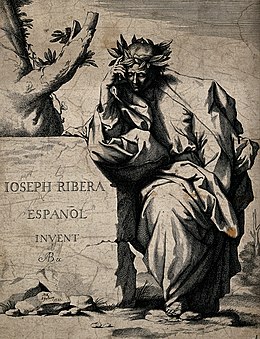
Weltschmerz (German: [ˈvɛltʃmɛɐ̯ts] ; literally "world-pain") is a literary concept describing the feeling experienced by an individual who believes that reality can never satisfy the expectations of the mind,[1][2] resulting in "a mood of weariness or sadness about life arising from the acute awareness of evil and suffering".[3]
The term was coined by the German Romantic author Jean Paul in his 1827 novel Selina,[1] and in its original definition in the Deutsches Wörterbuch by the Brothers Grimm, it denotes a deep sadness about the insufficiency of the world ("tiefe Traurigkeit über die Unzulänglichkeit der Welt"). The translation can differ depending on context; in reference to the self it can mean "world-weariness", while in reference to the world it can mean "the pain of the world".[4]
The worldview of Weltschmerz has been retroactively seen as widespread among Romantic and decadent authors such as Jean Paul, the Marquis de Sade, Lord Byron, Giacomo Leopardi, William Blake, Charles Baudelaire, Paul Verlaine, François-René de Chateaubriand, Oscar Wilde, Alfred de Musset, Mikhail Lermontov, Nikolaus Lenau,[5] Hermann Hesse,[6] and Heinrich Heine.[5]
- ^ a b "Weltschmerz | Romantic literary concept". Encyclopedia Britannica. Retrieved 2020-10-06.
- ^ Georg Büchmann (1898). Geflügelte Worte. Der Citatenschatz des deutschen Volkes. Haude & Spener'sche Buchhandlung (F. Weidling). pp. 223–224. Archived from the original on 2013-05-29. Retrieved 2022-01-31.
- ^ Beiser, Frederick C. (2016). Weltschmerz: Pessimism in German Philosophy, 1860-1900. Oxford University Press. p. 1. ISBN 9780191081347.
- ^ "Weltschmerz is the word that perfectly sums up how you're feeling right now". Metro. 2020-05-30. Retrieved 2020-07-18.
- ^ a b Braun, Wilhelm Afred (1905). Types of Weltschmerz in German Poetry. London: Columbia University Press. ISBN 9780231944823. Retrieved 9 April 2016.
- ^ Stelzig, Eugene L. (1988). Hermann Hesse's Fictions of the Self: Autobiography and the Confessional Imagination. Princeton, NJ: Princeton University Press. p. 81. ISBN 0-691-06750-3. Retrieved 9 April 2016.